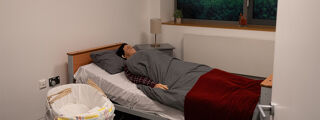The Home Environment flat is an immersive space designed to feel like you are entering someone's home. It is a self-contained flat which features a bedroom, shower room with toilet, and open plan kitchen and living space, where students can take part in simulation activities to prepare them for different scenarios on placement and in their future careers.
How has the Home Environment simulation space supported your learning?
Sonia: Having studied Business and Law previously, using the Home Environment simulation space added a new element to my study experience. It brought to life the scenarios that I was likely to face during placement. The home environment takes the theory we study and enhances it in a practical way, benefitting both my learning and placement opportunities.
Maya: Throughout our Core Skills Module, we relied heavily on the Home Learning Environment room to enhance our practical skills in preparation for placements. This simulated environment allowed us to encounter realistic, hands-on situations that closely mirror what we might experience during home visits. However, it was the presence of the Expert by Experience that truly brought the scenarios to life, offering us the chance to engage with authentic perspectives that cannot be replicated by theory alone.
The Home Learning Environment room created valuable real-life situations that helped me visualise the expectations and challenges associated with home visits, from understanding family dynamics to effectively communicating and building trust. Each session guided me through essential phases of an interaction. From the initial introduction, to actively listening to concerns, and finally concluding the conversation in a respectful, professional manner.
Social Work
Find out more about this course
Engaging with the Experts by Experience in these simulations encouraged me to step out of my comfort zone, adapt to unpredictable circumstances, and explore my own feelings and reactions in these situations. This experience not only improved my practical skills but also deepened my empathy and self-awareness, preparing me to handle similar situations in my future social work practice.
James Burke: During our core skills module, we used the simulation rooms on campus a lot. These rooms allowed us to consider our surroundings as we worked with Experts by Experience to practice our first assessment skills. For example, if the room was messy or if items like alcohol were on view, we could consider whether these were risk factors or possibly a result of the scenarios that we used. The simulation room was set up with mics and cameras which allowed us to review and discuss scenarios that Experts by Experience played out for us and consider how we might react in different situations. Overall, using the simulation rooms gave the sessions a more “real” feel and gave me the confidence to apply what was being taught in class to the simulation sessions.
Kofi: Social workers deal with complex issues and having the home environment available is very important in ensuring that we are provided with hands on experience, preparing us for both placement and future practice. The home environment serves as a stage where we can work on developing core social work skills such as problem-solving, and empathy. As student social workers with little to no front-line experience in social work, having the home environment provides us with a safe space where we can make mistakes, observe others, and engage with both lecturers and Experts by Experience. Through this, we gain feedback that can be used for personal reflection and professional growth.
